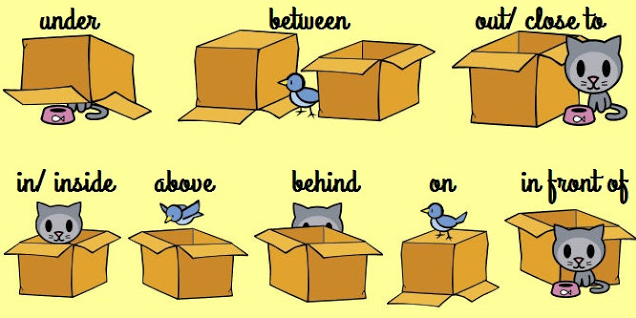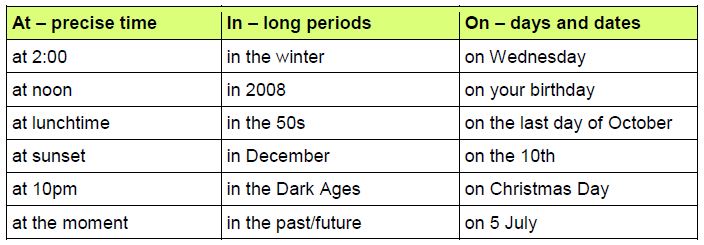 What is a preposition?
What is a preposition?
A preposition is a word used to link nouns, pronouns, or phrases to other words within a sentence. They act to connect the people, objects, time and locations of a sentence. Prepositions are usually short words, and they are normally placed directly in front of nouns.
A good way to think about prepositions is as the words that help glue a sentence together. They do this by expressing position and movement, possession, time and how an action is completed.
- The first rule is that to make sentences clear, specific prepositions are needed. The correct preposition means one particular thing and using a different preposition will give the sentence a very different meaning:
I want to see you in the house now! means something very different from
I want to see you on the house now!
In the house means Bill should go through the door, walk inside, and stand in the hall or living room.
On the house means Bill would need to get a ladder and climb to the roof where he would be on top of the house.
- The second rule for using prepositions is that prepositions are generally followed by nouns or pronouns.
- There are more than 100 prepositions in the English language. Remember that prepositions usually convey concepts such as comparison, direction, place, purpose, source possession, and time.
Prepositions are words like:
In, On, At, Over, Beyond, Under, Next to …
We say we are at the hospital to visit a friend who is in the hospital.
We can put a sign on the door or at the door.
We sleep in a bed, on the couch, at a friend’s house.
The party is in December, on a Sunday, at 3:00 pm.
1. Prepositions of Place: at, in, on
Generally, this is how we use these prepositions:
at (for a point)
in (for an enclosed space)
on (for a surface)

Examples:
on the left
on the right
on radio
on television
on my way
at Christmas
at present
at the same time
2. Prepositions of Time: at, in, on,
How can they be prepositions of place AND of time? The beauty of English!
Generally, this is how we use these prepositions:
at (for a precise time)
in (for months, years, decades and other long periods of time)
on (for days and dates)

With the word “weekend”, you may find some people say “at the weekend” and others may say “on the weekend”.
Generally speaking, “on the weekend” is American usage; both are acceptable simply because they are both used!
A very common mistake is to say:
In Tuesday morning. In Saturday afternoon. – BOTH ARE WRONG
This mistake is made because you think of “in the afternoon” and “in the morning”.- BOTH ARE CORRECT
But because the name of the day comes first, the rule “on Monday” “on Tuesday”, etc. will apply.
CORRECT: On Tuesday morning. On Saturday afternoon.
Other common mistakes:

The rule: When using last, every, this and next, we do not use a preposition.
3. Prepositions of Movement and Direction: to, toward (AmE), towards (BRE), around, through, etc
Some prepositions express movement. For example:
I will go to the bank on my way to work.
The fish slowly swam toward the bait.
We’ll have to drive around the lake.
In the summer the train goes right through these mountains.
To make things even more confusing, we sometimes use no prepositions at all when talking about movement.

Exercise:

EXERCISE: PREPOSITIONS (Advanced)
(Use in, at, on, by, for, to, out, without, of)
1) She paid for lunch ___ advance, so we don’t need to pay now.
2) I went to the wrong house ___ mistake.
3) Please make sure that you’re ___ time for the class.
4) I was walking to the station and ___ chance I saw the glove that I’d lost on the ground.
5) I love eating out in London. ___ instance, one of my favourite (favorite) restaurants has amazing Japanese food.
6) I think the cat is ___ danger on that high roof.
7) I picked up the laptop and ___ my surprise it fell apart in my hands.
8) I have a lot ___ common with my cousin. We both like many of the same things.
9) If the baby starts to cry, pick her up ___ once.
10) Did you forget your purse ___ purpose so you wouldn’t have to pay?
11) It’s best to arrive ___ foot because there is nowhere to park.
12) What do a whale and a dolphin have ___ common?
13) He added salt instead of sugar ___ mistake.
14) What’s your favourite (favorite) thing to do? ___ instance, do you like sport?
15) The book was ___ ___ reach on a high shelf.
16) I want to go to Germany ___ a change. I’ve never been there.
17) Please let me know ___ advance if you can’t come to the meeting.
18) She often goes to school ___ foot.
19) Do you always brush your teeth before bed ___ fail?
20) The little girl broke the toy ___ purpose because she was so angry.
21) Please come ___ once. We have a big problem.
22)She worked very hard and ___ last she managed to pass the exam.
23) We need to be ___ time or my grandmother will start to get anxious.
24) It feels like owning a house is ___ ___ reach. I’ll never be able to do it.
25) We thought about it a lot and ___ last we decided to buy a new flat.
26) We watched a film ___ a change. Usually we read.
27) She was really ___ danger for a few minutes in the rough sea, but luckily a lifeguard saw her.
28) I went to the bookshop and ___ chance I found a really interesting book about Switzerland.
29) He walked into the kitchen and __ his surprise there was food all over the floor.
30) She drinks a litre (liter) of water every day ___ fail.
When to use in time or on time?
ON TIME
ON time is a phrasal verb that means “punctual”. She is always ON time for her rehearsal. “ON time” means that something happened by the scheduled time (whether earlier or exactly at the scheduled time).
IN TIME
“IN time” means something happened early enough to allow for something: one is IN time for some event, like the departure of a train or the beginning of a parade.
IN time by itself is a phrasal verb referring to rhythmic patterning: His notes were not IN time with the drumbeat.
In time can also mean “eventually”: IN time she will use the Present Perfect tense perfectly.
Examples
My plane arrived ON time, so I got home IN time for the party”.
But one can fail to be “ON time” while still being “IN time”:
Although the train wasn’t ON time and I was delayed for half and hour, I still arrived in time for the meeting.